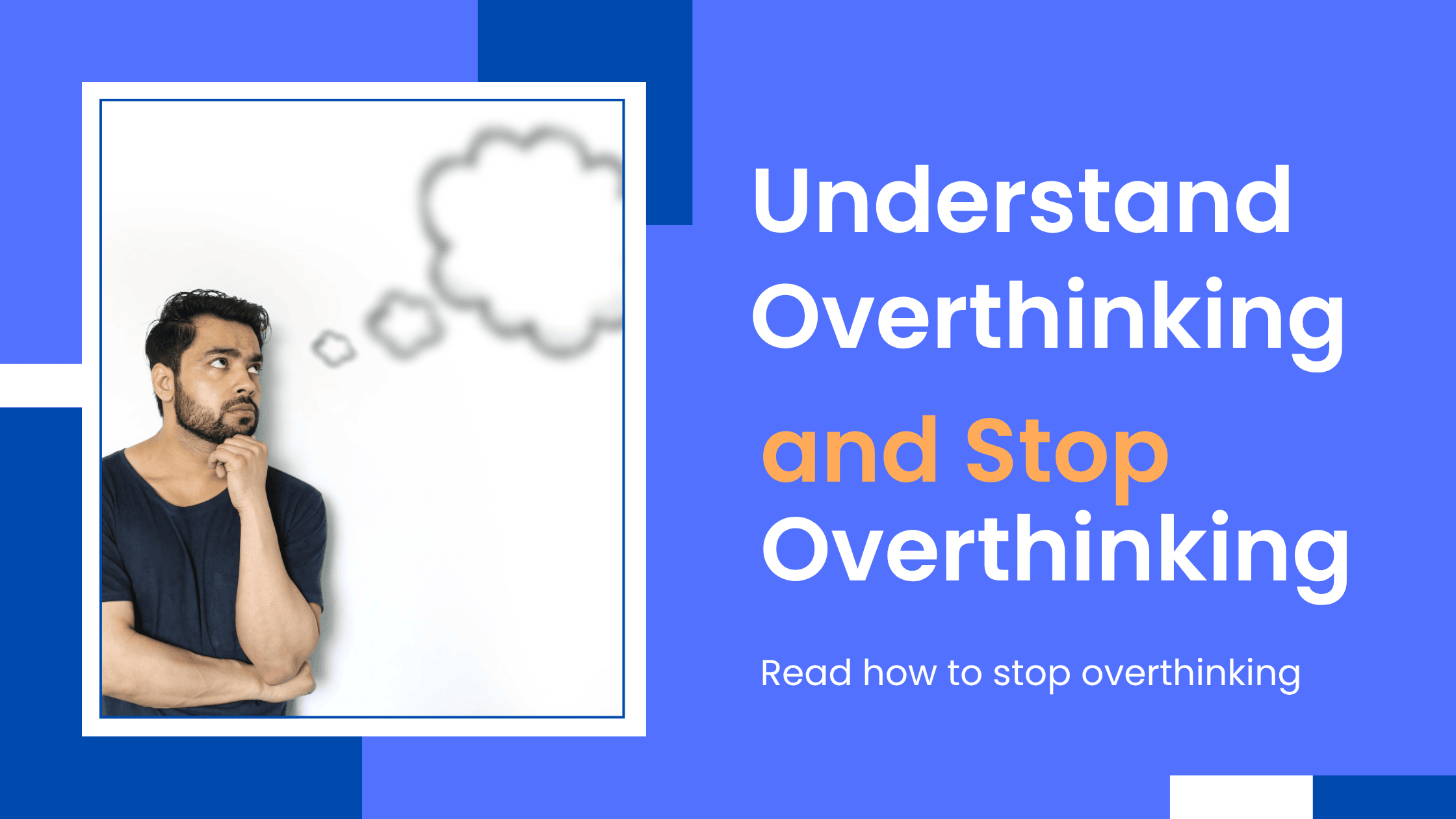1) Why does the HUMAN BRAIN engage in such complex processes of overthinking?
2) WHY am I always overthinking everything?
3) What is Overthinking?
4) How do i stop overthinking?
5) How does counseling help to stop overthinking?
WHAT IS OVERTHINKING?
An endless loop of thoughts where a person can’t stop thinking. Psychologically, a person feels helpless and, rather than preparing for the next step of action, they become stuck in a negative loop of thoughts, which leads them to inaction. Additionally, past failures or traumas can create an auditory or visual thought pattern that is entirely negative. Overthinking is a state of confusion or helplessness where a person feels depressive, anxious and fearful.
UNDERSTANDING YOUR BRAIN
You need to understand overthinking first before taking action. Why do I overthink everything so much? What causes overthinking? The most important thing to realise is that our brain has two key parts, which are the prefrontal cortex and the Limbic System. Both are responsible for the overthinking. If you can understand how your brain functions, your cognition, and your thought patterns, it is easier to overcome Overthinking. But without understanding, you end up with nothing.
A) PREFRONTAL CORTEX
The prefrontal cortex, a key part of the brain, is responsible for analysing situations, decision-making, planning, and self-control. However, when this part of the brain is unable to reach a decision, it can lead to a loss of self-control, resulting in overthinking.
B) LIMBIC SYSTEM
The limbic system, which includes the amygdala, hippocampus, and hypothalamus, is responsible for managing fear and stress. When your mind is overthinking, the amygdala, a part of the limbic system, gives signals of fight or flight, triggering emotional responses.
Why does the HUMAN BRAIN think a LOT?
So, here I am dividing the causes of overthinking into four parts
Psychological Factors:
A. Anxiety and Fear:
People tend to worry excessively about the future and are overly attached to the outcomes, often overthinking a lot. People with a fearful nature tend to worry continuously and become anxious over minor changes, often overthinking excessively.
B. Past Trauma:
Trauma plays a significant role. Because the past haunts many people. As our brain operates on a survival mechanism, it tends to think a lot about the future. Also, as mentioned above, people with post-traumatic stress disorder think much about the future because they do not want to experience pain. Due to the stress of the Trauma, a person tends to overthink a lot.
C. Perfectionism:
Perfection has been highly appreciated for many years now. Many Motivational speakers used to emphasise perfectionism a lot, which became an obsession for many. Due to that, they become imposters and become overly attached to results. When one feels they are perfect in everything, they often do not want to act, as they believe it is never ideal for them. But it turns into overthinking.
D. Low Self-Esteem:
Low Self-Esteem is about trust in one’s skills and qualities. When a person has low self-esteem, they feel like they are not enough, not capable of doing things. Additionally, they tend to engage in self-negative thinking. Low self-esteem always turns into overthinking.
Physical Factors:
A. Brain Chemistry:
Neurotransmitters such as adrenaline, Cortisol, Dopamine, and Serotonin play a crucial role in the overthinking pattern. It is also responsible for the Thought pattern of a human being.
B. Evolutionary Perspective:
The evolutionary perspective is responsible for problem-solving and shaping thought patterns.
Environmental Factors:
A. Social Anxiety:
Acceptance of a human being as they are by society is a crucial aspect in achieving safety and well-being. Apart from basic needs, a relationship with other human beings and society is a must. However, when there is a lot of social uncertainty, overthinking becomes a common phenomenon. The social factor plays a significant role in overthinking because it increases uncertainty in the mind. Social anxiety doubles the trouble of a person.
B. Uncertainty:
Insecurity and uncertainty play a crucial role in the mind. Because when things continuously evolve, the negative aspects create lots of trouble. “What will be the next?” – thought creates more trouble in a person’s mind, as external factors are more volatile and unpredictable.
Cognitive Factors:
A. Negative Thought Pattern
When a person tends to view things negatively and observe all negative stuff first, they have a high tendency to overthink.
B. Difficulty in Problem Solving:
Problem-solving is a skill where a person looks for a solution rather than focusing on the problem. However, many human beings tend to view problems as victimisation. They often overthink, becoming victims and unable to solve the same problems, which perpetuates the cycle of overthinking because they predict the outcome and are unable to take action to resolve them.
C. Control External Factors:
Many humans tend to control external factors in their minds. They expect so much from the others and the outside world. They also want to prevent uncertainty and the unknown, driven by a fear of pain and suffering. And controlling unknown and external factors leads to a lot of overthinking.
HOW DO I STOP OVERTHINKING?
This negative loop of thoughts causes considerable trouble. Until one reaches a level of helplessness and hopelessness. As you have been through the above text, you can understand what overthinking is. In my practice, I have seen many cases where individuals know they overthink, but they are unable to overcome it. Because many feel it is reality, and while others want to control the external and uncertain outcome, they are not ready to accept the situation as it is. However, here are some important points I’d like to share with you to help you stop overthinking.
1) DON’T PROCRASTINATE
Procrastination is a way to prolong the current action mode to the future one. Even though you feel the outcome is not in your favour, act upon it rather than prolong it to the next level. Instead of spending too much time thinking, “What if?” Take action.
2) ASK YOURSELF OPEN-ENDED QUESTIONS
What am I thinking is correct? Have you ever asked yourself this question? If not, try it. Because when you are asking wise questions yourself, you get the wise answers. Open-ended questions always help you to dig into your fears.
3) CHECK YOUR FACTS
Do you think that things are as bad as your brain portrays? Don’t forget that your brain works on a survival mechanism. Hence, you feel negative first. But when you can check facts and reality, your brain shuts down, and you can think of solutions.
4) DEEP BREATHING AND MEDITATION
Of course, practising mindfulness helps a lot. Being present plays the most important role. When you feel overthinking, you can breathe deeply. Take long and deep inhalations and exhalations to calm your agitated mind. Try to be present as much as you can. But that is only possible when you are in action and not attached to the outcome.
5) PRACTICE WRITING
We are currently embracing technology, so using pen and paper is now considered old-school. But while you overthink, you can write on a piece of paper. This gives you lots of mental clarity, and you can stick to reality rather than hypothetically think about unknown and uncertain things. If you practice the same daily, you may slowly get control of your mind. And it gives you more sources for solutions.
6) DON’T USE DISTRACTION
We all easily distract, especially when we are not feeling well emotionally. Distraction keeps your eye away from the core problem. When you use distraction, you cause more problems because you are not focused. It takes a little longer to come back to the attention state. Distraction never solves problems; rather, it aggravates them.
7) LIST OUT YOUR LIMITATIONS AND SKILLS
When you know your limitations and skills, you are more confident in your ability to deal with situations. For example, if you go to the Gym and try to lift heavy weights on the very first day, you may break your muscles. But as you practice slowly, you start lifting weights. When you acknowledge your limitations, you work on them and gradually make them your strengths, allowing you to stop overthinking.
8) STOP CONTROLLING EXTERNAL FACTORS
When you expect something from someone that is not in your control or try to change something uncertainly, it creates lots of trouble in your mind. You want to change your external factors, but are they really in your control? Again, asking wise and open-ended questions can get answers to many problems.
HOW DOES COUNSELING HELP TO STOP OVERTHINKING?
Counselling and therapies always prove best. Sometimes, you don’t get solutions to problems that are beyond your control. Therapies help you to understand it very clearly. Your cognition will improve, and your interpersonal skills will help you overcome issues related to overthinking. Various therapies, such as Cognitive Behavioural Therapy, Dialectical Behaviour Therapy, and Acceptance and Commitment Therapy, can significantly help alleviate overthinking.





